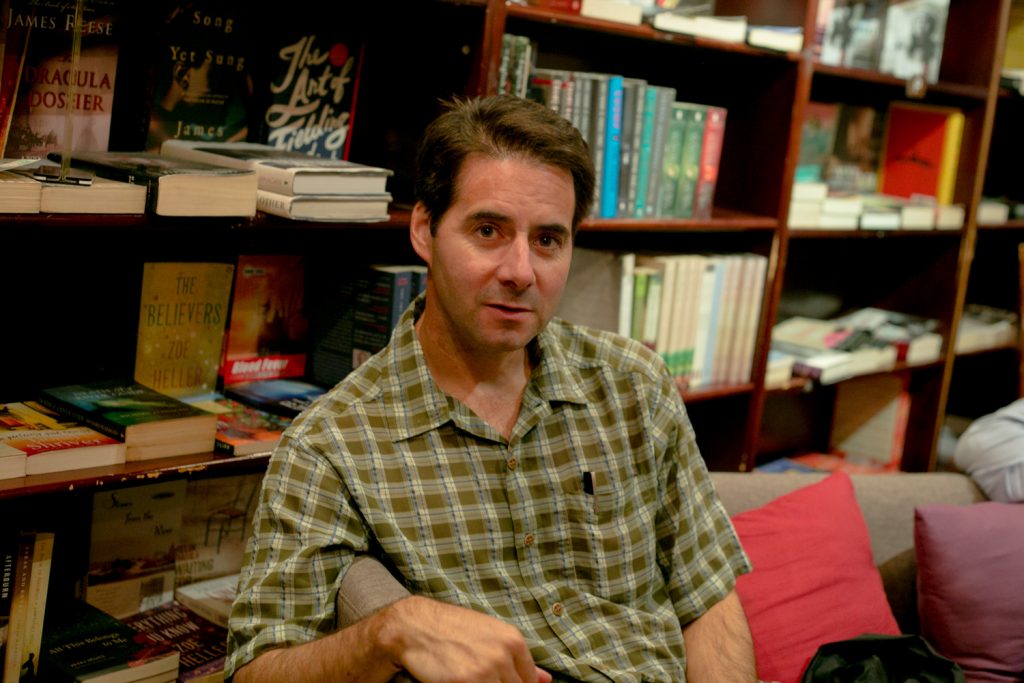
采访日期:2016年9月13日 Interview Date:September 13, 2016
Peter Hessler(彼得·海斯勒),中文名何伟,阿拉伯名字Boutros,美国作家与记者。被《华尔街日报》赞为“关注现代中国的最具思想性的西方作家之一”。毕业于普林斯顿大学及牛津大学,曾为《华尔街日报》、《国家地理》等刊物自由撰稿,“当代中国三部曲”《江城》、《寻路中国:从乡村到工厂的自驾之旅》、《甲骨文》是其代表书作。2000-2007年,他出任《纽约客》驻北京记者;2011年秋天至2016年夏天,移居埃及,任《纽约客》中东记者。
Peter Hessler, with a Chinese name “He Wei” and an Arabian name “Boutros”, is an American writer and journalist. He is crowned as “one of the most insightful western writers with interest in modern China.” Graduating from Princeton University and Oxford University, he has contributed numerous articles to Wall Street Journal and National Geographic, among other publications. His representative works include River Town, Country Driving: A Journey from Farm to Factory and Oracle Bones, which are called “the trilogy of contemporary China”. From 2000 to 2007, he served as journalist of The New Yorkersin Beijing. From the autumn of 2011 to the summer of 2016, he migrated to Egypt and served as journalist of The New Yorkers in the Middle East.
※
对于中国的海外报道中常出现的严声批判,不少中国人爱拿“这些外国人不懂我们中国”作为置之不理或义愤填膺的挡箭牌。美国作家及记者何伟(Peter Hessler,中文文稿用其中文名)的当代中国三部曲,让不少中国读者深感:他甚至比很多中国人都更了解中国。
As for the criticism frequently occurring in overseas coverage of China, many Chinese people use “These foreigners know nothing about China” as an excuse to turn a cold shoulder to the coverage. Peter Hessler, an American writer and journalist, impresses many Chinese readers with his trilogy of contemporary China. Many readers feel that he has got a better understanding of China than many Chinese people.
※
2016年,成都秋夜,一场关于“20年后重返中国”(Coming back China after 20 years)的讲座上,何伟在今年夏天结束五年的埃及生活,久别来华。现场座无虚席,中外读者齐聚,对他们而言,能见到何伟确是一件激动人心的事情。
On an autumn evening in Chengdu in 2016, a lecture themed by “Coming Back China after 20 Years” was held. Peter Hessler came back to China after bringing his 5-year life in Egypt to a close this summer. With all seats occupied, the lecture attracted readers from home and abroad. It was so exciting for them to see Peter Hessler.
从90年代的中国“冒险”开始
The Story Begins with the “China adventure” in 1990s
1996年至1998年,何伟以美国和平队志愿者的身份派往重庆涪陵师范学校(今长江师范学院)任教,与大多数前来中国的志愿者一样,他不曾想到会与中国产生长久的关联。他说:“90年代的中国不是什么大角色(big deal),不足以吸引有雄心壮志的美国年轻人,那时候,很少人有独到的视野,能预想到中国会变成今天这样。”何伟说自己来中国也并非因为视野,而是因为通过志愿者这种便宜而独特的方式。
From 1996 to 1998, Peter Hessler was sent to Chongqing Fuling Normal School (now it is named as Yangtze Normal University) as a American Peace Corps volunteer. Just like most foreign volunteers in China, never has he thought about any long-term connection with China. He said, “China was not a big deal in the 1990s. It was not attracting the young and ambitious American. At that time, only a few people were insightful enough to preconceive that China would transform like this.” Peter Hessler said that the reason for him to come to China was not due to insightfulness, but because of the fact that being a volunteer was quite an economical and unique way of an exploration.
于是,当他的美国友人在为事业打拼,进行财富和地位累积时,何伟正在毫不知名的中国小城“消失两年”,他不认为这是一种牺牲,反而是甘心选择的一场未知冒险。他也不曾预料到,涪陵两年,会产生《江城》这本书,也并不知道这本书一经推出即获得“Kiriyama环太平洋图书奖”,奠定了他的职业和人生道路。
Therefore, when his American friends were making a living, accumulating wealth and striving for social status, Peter Hessler had dwelled in a nameless Chinese town for two years. He never considered it as a kind of sacrifice, but an unknown adventurous trip made of his own accord. He had never imagined that he would publish River Town during his two-year stay in Fuling, part of a gigantic Chongqingmunicipality.Similarly, he had neverimagined that the book would be awarded “Kiriyama Prize (Pacific Rim)” upon being published, and then be the cornerstone for his career and life.
上世纪90年代,外教在中国还是一个新鲜的概念。但也因为身处在这样一个没有DVD、邮件、通讯不发达,大哥大全城都只有两部的1996年,使何伟有机会与身边的本地人产生亲密联系(close contact),他也得以感受到在特定年代下中国人带着温存的生活气息。
In 1990s, foreign teacher was a novel concept in China. Nevertheless, it was in 1996, when DVD was unavailable, email and communication were underdeveloped with only two cellular phones in the city, that Peter’s close contact with local people was facilitated. Thanks to that, he was able to experience the special flavor of Chinese life in a specific era.
至今,何伟与教过的大概百来位学生依然保持联系,从信件、电话到邮件。表达关心的同时,这些学生也成为何伟观察中国的一个窗口。每年,何伟发送有针对性的问题给学生。前几年是关于经济,何伟希望通过他们了解中等收入人群(Medium Income)的情况。何伟说:“1998年毕业后的大部分学生当了老师,那时平均年收入大概是500美元,前两年,大部分学生如今的收入超过16000美元/年,平均年收入大概是20000美元/年,这是一个巨大的飞跃。当我问学生如何看待自己的社会地位(Social Class)时,70%的学生回答是‘下层阶级’(Lower Class)或者是‘贫穷’(Poor),甚至不少学生说自己是无产阶级(Proletariat),但是无论从任何定义而言,他们都可以说是中产阶级。其中一个学生的年收入50000美元,他的孩子读私立学校,他有三套房子、有车,且没有任何负债,但是他依然说自己是‘下层阶级’。”
So far, Peter Hessler has kept in touch with over 100 students, through letters, phone calls and e-mails.While caring for them, the contact with the students has been a window for Peter to observe China. Every year, Peter sent targeted questions to students. Several years ago, the questions were about economy. Peter wanted to get a better understanding of medium income group. He said, “Most of the graduates in 1998 became teachers, with an average annual income of about 500 USD. In recent years, most students’ annual income has reached over 16,000 USD, and the average annual income has been 20,000 USD. What an impressive leap! When my students were asked how they describe their own social class, 70% of them answered “lower class” or “poor”, and many of them even called themselves “Proletariat”. Nevertheless, by all definitions, they can be labeled as a middle class group. One of my students, without any debt, has an annual income of 50,000 USD, with a car, three houses and a child studying at private school. But he still asserted that he was among the lower class group.
“生活已经改变了,但是人们大脑层面的设定需要时间来调整(Mind set takes time to readjust)。”何伟如是说。
“Life has changed, but mindset takes time to readjust,” said Peter Hessler.
链接LINK
根据瑞士信贷银行发布的《全球财富报告2015》,中国中产阶级人数达到1.09亿人,虽然只占全国成年人口的11%,但却超越美国的9200万人,成为全球中产阶级人数最多的国家。
According to the Global Wealth Report 2015 released by Credit Suisse, the number of Chinese middle class reached 109 million. Although the number only accounted for 11% of national adult population, it outnumbered that of America, and China became the county with largest middle class population in the world.
疏离下的视野,以小见大的洞察
Seeing from High Above, Observing in Specific Details
离开涪陵的六个月前,在导师约翰·迈克菲的鼓励下,何伟才开始动笔写《江城》。虽然高中时他便有了作家梦,但他清楚写作是一个长期的过程,即便是知名的作家,20岁时也有写得很糟糕的。经历使写作更丰盈,更成熟。
Six months before leavingFuling, receiving an encouragementfromhis tutor John McAfee, Peter started to write River Town. Although he had dreamed of being an author when he was a senior high school student, he knew quite well that writing was a long journey. Even for famous writers, poor performance in writing was nothing new at their age of 20. It is one of the experiencesthat makes writing more full-fledged.
何伟的第四部书作《奇石——来自东西方的报道》收录了他曾在《纽约客》上发表的专栏文章,从这些精彩报道中,恰好可以一探何伟的创作视角——无论身在东方还是西方,他从不打算融入社会,而是保持疏离感,以小见大记录普通人的故事。
The articles published on the columns of The New Yorker are included in Strange Stones: Dispatches from East and West, the fourth book of Peter Hessler. Peter’s creative angle of view can be seen from the wonderful coverage: He never intends to integrate himself into society, no matter where he is. Instead, he keeps aloof from society, records the stories of ordinary people and digs out inspiration from every single detail.
“所有重要的政治事件,在小城凡人背后若隐若现。”何伟敏锐冷静,保持陌生,“潜入”不同政治制度、经济文化下活生生的人与事。由此,他记录了许多普通人的故事,画家、警察、出租车司机、体育运动员、学生艾米莉、多恩医生……却让中西读者都能通过这些人物得到共鸣,或窥见世界。何伟学习中文、阿拉伯语是为了借由语言更好地了解所观察的社会,为了“异地书写而能深入其境”,而非融入异国他乡,他说:“写作者寻求同理心的联系(Empathy connection),如果拥有语言技巧,会容易得多。”即便精通中文,他依旧适时运用“创造性口吃”以便于自己的观察和记录。
“All the important political events are hidden behind ordinary people’s stories in the small town.” Staying perspicacious, calm and aloof, Peter Hessler dives into different political systems, economy and culture. He has recorded stories of many ordinary people, including painter, policeman, taxi driver, athlete, student Emily and doctor Donne. The figures can strike a responsive chord for Chinese and western readers, and bring them closer to the world. Peter studied Chinese and Arabicto acquirea better understanding of the society that he observes, rather than to integrate into a foreign country. According to him, by virtue of language, he can write out of hometown with incisive perspective. He said, “It will be much easier for writers with language skills to seek empathy connection.” Even though he’s proficient in Chinese, he still utilizes “creative stammer” from time to time, in a bid to facilitate his observation and record.
作为纪实记者,何伟并没有全然运用新闻提倡的中立身份,他既把“我”的角色带入语境,加入自己的视角,又在行文时与人事保持疏离感。他说:“表达观点意见是很微妙的事情。我尽量抑制自己不去妄下定论。”何伟的非虚构写作,行文中几近白描,慎用修辞。他说:“非虚构写作不能编故事,它逼着作者不得不卖力地发掘事实,搜集信息,非虚构写作的创造性正蕴含在此间。”
As an on-the-spot journalist, Peter Hessler does not completely take a neutral stance promoted in news. He brings “I” into the context with individual perspective, and keeps distantfrom the events and figures. He said, “It is rather subtle to express opinions, and I try my best to refrain from jumping to conclusions.” Peter’s non-fiction writing features simple delineation and cautiously used rhetoric. “Non-fiction writers cannot make up stories. We have to dig out facts and collect information, and that’s the reason why non-fiction writing is so creative.”
“有人跟我说,希望拥有我的经历,希望也身在那个特定的年代,说‘你有素材可以记录,我已经没有了’。但其实中国依旧魅力不减,总是有不可思议的素材,中国不会缺少故事。”
“Some people told me that they wish they could have been there and had that experience. They said ‘You have something to write but I don’t have anynow.’ As a matter of fact, China has always been an amazing land, full of incredible materials.”
※
All rights reserved, contact Lenore to know more.
